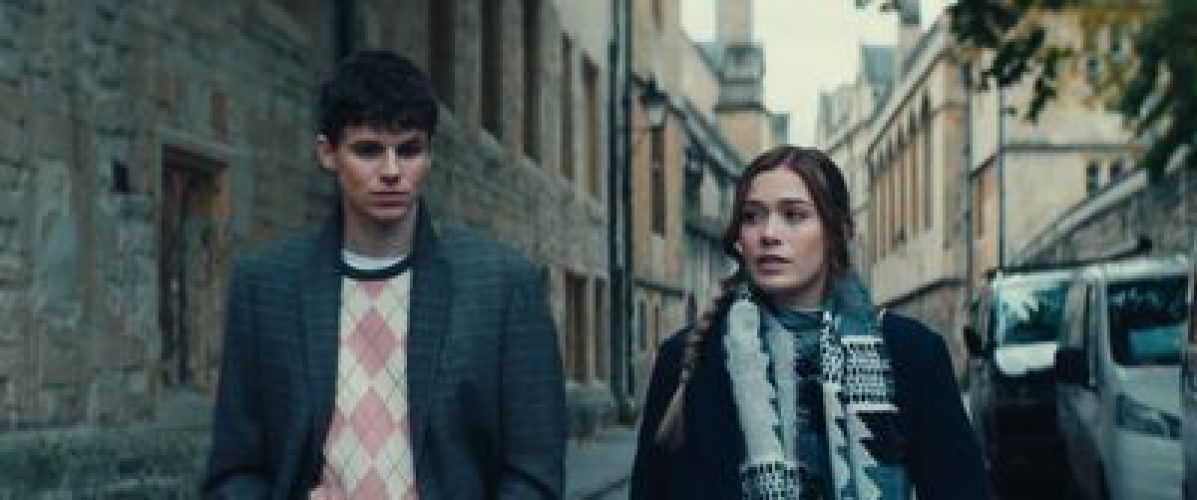Both the book and the movie “Surprised by Oxford” take their title from C.S. Lewis’ Christian apologetical Surprised by Joy. Like Lewis, Carolyn (Caro) Weber is a skeptic-turned-believer, and the memoir and film are based on her experience at Oxford, where she attended a college 400 years older than the United States of America. Oxford itself, the town, the buildings, and the institution is one of the movie’s most significant characters. Almost every shot of the film is filled with its grandeur, dignity, splendor, and traditions. It’s a real-life Hogwarts for grown-ups. Every detail of architecture, every lecture, every white tie dinner in the grand hall, every outraged reminder that no pens may be used in the library, only pencils to protect the priceless books, all point to the importance of intellectual rigor and its satisfactions.
For Caro (a lovely performance by Rose Reid), intellectual rigor is all that matters when she first arrives as a scholarship student planning to study romantic poets (late 18th to mid-19th century writers like Wordsworth, Keats, Donne, Shelley, and Coleridge) for a master’s degree. When first told of Lewis’ book, she points out that he took his title from a Wordsworth poem. While the poets she studies explore emotion and concepts like the sublime, Caro approaches them in an analytical, hyper-rational manner. She was a precocious child, reading the Iliad and the Odyssey by age seven, encouraged by her adored and adoring father (in the book, she said he “smelled like wisdom”). But then he was arrested and out of her life. As a young adult, Caro still struggles with feelings of abandonment that keep her from close connections with others. Learning that “the father I knew was an illusion,” she rejects anything that cannot be proven to be true. She aspires to be “teleological,” like Aristotle, seeing objects and events in terms of their purpose and their goals. She arrives at Oxford fiercely committed to a life of achievement (a PhD is next on her list) and relentless pursuit of knowledge, which she defines as what can be proven. Can she be “properly ravished” by the truth, as poet John Donne describes it? Can “longing for the infinite” be reconciled with the idea of proof?
The movie is not subtle. When Caro passes through the 14th-century doors of the dorm, she discovers that the window of her room looks out on a brick wall. A student film night features Oxford rival Cambridge as a setting for “Chariots of Fire,” a movie that opens with a scene in a cathedral and centers on a Christian athlete’s refusal to race on the Sabbath.
The biggest failing of “Surprised by Oxford” is its barely-sketched-in secondary characters, who exist to provide support (and slight contrast) for Caro. Even “Downton Abbey’s” Phyllis Logan, as a sympathetic provost, is one-dimensional. These characters are there only to be endlessly supportive, with the gentlest guidance. That even applies to the character who is intended to be the one who challenges Caro’s assumptions, an American student named Kent (Ruairi O’Connor, living up to Kent’s affectionate nickname TDH—tall, dark, and handsome).
Caro’s interactions with Kent mingle romance and theology. He is immensely appealing in both. He is patient, takes himself lightly, and never pushes Caro, but he knows who he is and what he believes. She finds his sense of purpose and abundance meaningful and understands that she has been in denial about “the stab of inconsolable longing” she insisted on calling commitment to truth. Like a similarly themed movie, “Blue Like Jazz,” this one is wise to make seeing the way Kent and the provost engage with the world more important than what they say about God, as it will be to those in the audience.
“I’m realizing there is a strength to belief,” Caro says. She misused words like “mansplaining” and “patriarchy” more as shields than swords, cutting off conversation instead of substantive responses. “The truth is in the paradox,” she admits. Recognizing ambiguity and the limits of proof-based knowledge enables her to find more of a sense of purpose than the empiricism she thought was all she needed. Believers, seekers, and non-believers looking for something more sustainable than pleasure will recognize that challenge and appreciate a university and a film that engages with it so seriously.
Now playing in theaters.
Both the book and the movie “Surprised by Oxford” take their title from C.S. Lewis’ Christian apologetical Surprised by Joy. Like Lewis, Carolyn (Caro) Weber is a skeptic-turned-believer, and the memoir and film are based on her experience at Oxford, where she attended a college 400 years older than the United States of America. Oxford itself, the town, the buildings, and the institution is one of the movie’s most significant characters. Almost every shot of the film is filled with its grandeur, dignity, splendor, and traditions. It’s a real-life Hogwarts for grown-ups. Every detail of architecture, every lecture, every white tie dinner in the grand hall, every outraged reminder that no pens may be used in the library, only pencils to protect the priceless books, all point to the importance of intellectual rigor and its satisfactions. For Caro (a lovely performance by Rose Reid), intellectual rigor is all that matters when she first arrives as a scholarship student planning to study romantic poets (late 18th to mid-19th century writers like Wordsworth, Keats, Donne, Shelley, and Coleridge) for a master’s degree. When first told of Lewis’ book, she points out that he took his title from a Wordsworth poem. While the poets she studies explore emotion and concepts like the sublime, Caro approaches them in an analytical, hyper-rational manner. She was a precocious child, reading the Iliad and the Odyssey by age seven, encouraged by her adored and adoring father (in the book, she said he “smelled like wisdom”). But then he was arrested and out of her life. As a young adult, Caro still struggles with feelings of abandonment that keep her from close connections with others. Learning that “the father I knew was an illusion,” she rejects anything that cannot be proven to be true. She aspires to be “teleological,” like Aristotle, seeing objects and events in terms of their purpose and their goals. She arrives at Oxford fiercely committed to a life of achievement (a PhD is next on her list) and relentless pursuit of knowledge, which she defines as what can be proven. Can she be “properly ravished” by the truth, as poet John Donne describes it? Can “longing for the infinite” be reconciled with the idea of proof? The movie is not subtle. When Caro passes through the 14th-century doors of the dorm, she discovers that the window of her room looks out on a brick wall. A student film night features Oxford rival Cambridge as a setting for “Chariots of Fire,” a movie that opens with a scene in a cathedral and centers on a Christian athlete’s refusal to race on the Sabbath. The biggest failing of “Surprised by Oxford” is its barely-sketched-in secondary characters, who exist to provide support (and slight contrast) for Caro. Even “Downton Abbey’s” Phyllis Logan, as a sympathetic provost, is one-dimensional. These characters are there only to be endlessly supportive, with the gentlest guidance. That even applies to the character who is intended to be the one who challenges Caro’s assumptions, an American student named Kent (Ruairi O’Connor, living up to Kent’s affectionate nickname TDH—tall, dark, and handsome). Caro’s interactions with Kent mingle romance and theology. He is immensely appealing in both. He is patient, takes himself lightly, and never pushes Caro, but he knows who he is and what he believes. She finds his sense of purpose and abundance meaningful and understands that she has been in denial about “the stab of inconsolable longing” she insisted on calling commitment to truth. Like a similarly themed movie, “Blue Like Jazz,” this one is wise to make seeing the way Kent and the provost engage with the world more important than what they say about God, as it will be to those in the audience. “I’m realizing there is a strength to belief,” Caro says. She misused words like “mansplaining” and “patriarchy” more as shields than swords, cutting off conversation instead of substantive responses. “The truth is in the paradox,” she admits. Recognizing ambiguity and the limits of proof-based knowledge enables her to find more of a sense of purpose than the empiricism she thought was all she needed. Believers, seekers, and non-believers looking for something more sustainable than pleasure will recognize that challenge and appreciate a university and a film that engages with it so seriously. Now playing in theaters. Read More


